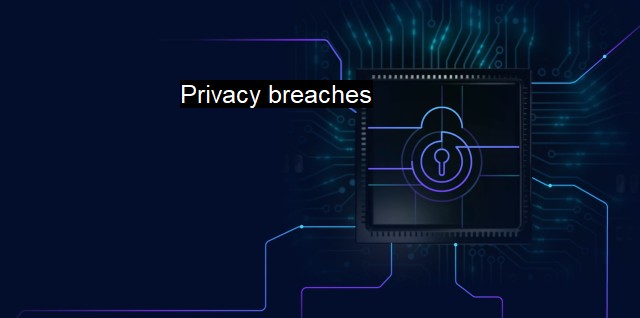What are Privacy breaches?
Protect Your Confidential Data from Cybersecurity Attacks: Understanding and Preventing Privacy Breaches
Privacy breaches, with refer to the unlawful or unauthorized access, collection, use, disclosure, alteration, or destruction of personal information. In an era dominated by digital identities, where the internet has become an essential part of our everyday lives, ensuring privacy has become a critical concern.In cybersecurity domain, privacy breach centers on the notion that individuals have a right to keep their personal information private and secured. This is often considered a fundamental human right. Personal information ranges from medical records, financial data, to personal photos and conversations. The expected norm is that personal data, once shared or stored digitally, would be adequately protected by keeping confidential and secret. when these protective measures fail or are compromised, the outcomes can be devastating. This is what is typically referred to as a privacy breach.
These breaches can occur in various ways but are primarily orchestrated by cyber criminals who sought to exploit the vulnerabilities in system defenses for their gain. Common methods used by these criminals include phishing attacks, malware, ransomware, hacking, and denial of service attacks.
Phishing attacks are one of the most common forms of privacy breaches. Here, the attacker fools the victim into revealing sensitive data by disguising as a trustworthy entity such as a renowned company or institution. The acquired data could range from login credentials to credit card information.
Malware is another tool commonly used in privacy breaches. This refers to any software intentionally designed to cause damage or unauthorized access to a system. Cybercriminals often use malware to collect private data from an infected computer or network.
Ransomware is a subtype of malware. In ransomware attacks, the attackers encrypt the victim's data and demand a ransom to decrypt and restore the data. Until the ransom is paid, the victim is deprived of access to their information, constituting a privacy breach.
In hacking, attackers exploit vulnerabilities in a system or network to gain unauthorized access and consequently collect personal data. This intrusion into the system constitutes a noticeable form of privacy breach, which inadvertently leads to personal data misappropriation or misuse.
Denial of service attacks do not usually target personal data. by causing a server or network to be unavailable to its intended users, they interrupt access to necessary personal data by the authorized party thereby indirectly causing a privacy breach.
Antivirus is a fundamental measure taken to solve the issue of privacy breaches. Installed on computer systems, it aims to provide a filter between networks or systems and the external world, hence acting as a security barricade. This software identifies, quarantines, and eliminates malware proactively. It also examines incoming data and alerts the user of potential privacy breaches, thus providing ample time to initiate preventive actions.
Antivirus is not entirely foolproof. As cybercriminals continue to rampage the Internet space with more sophisticated methods, it's paramount to acknowledge that preventive measures involve more than having updated antivirus software. It includes practicing safe browsing habits, investing in comprehensive identity theft protection services, frequently changing passwords, embracing multi-factor authentication features, and regularly backing up data. Often, privacy breaches are a result of a combination of weak system defenses and unaware users.
The world has been digitized and privacy breaches pose significant challenges in today's interconnected society. As a society collectively reliant on the internet, it's our prerogative to understand, adopt, and continuously improve practices that ensure the protection of our personal data. With the right blend of technologies, practices, and awareness, the threat of privacy breaches could be significantly mitigated.

Privacy breaches FAQs
What is a privacy breach in the context of cybersecurity?
A privacy breach occurs when an unauthorized person gains access to personal or confidential information without the owner's consent. In the context of cybersecurity, this can happen through various means including malware, phishing, or hacking.What are the consequences of a privacy breach?
Consequences of a privacy breach can be severe and include identity theft, financial loss, reputational damage, and legal action. A privacy breach can have serious implications for individuals and businesses, including loss of trust and damage to relationships with customers, clients and partners.How can antivirus software help prevent privacy breaches?
Antivirus software can help prevent privacy breaches by identifying and stopping malicious software before it can do harm. Antivirus software can detect and remove viruses, malware, spyware, and other threats that can be used to gain unauthorized access to personal or confidential information. By using antivirus software, individuals and businesses can reduce the risk of a privacy breach and protect sensitive data.What can individuals and businesses do to protect against privacy breaches?
Individuals and businesses can take several steps to protect against privacy breaches, including using antivirus software, creating strong and unique passwords, avoiding suspicious emails or messages, and being cautious when sharing personal information online. It is also important to keep software and security systems up-to-date, and to regularly backup important data. By taking these steps, individuals and businesses can reduce the likelihood of a privacy breach and protect sensitive information.| | A | | | B | | | C | | | D | | | E | | | F | | | G | | | H | | | I | | | J | | | K | | | L | | | M | |
| | N | | | O | | | P | | | Q | | | R | | | S | | | T | | | U | | | V | | | W | | | X | | | Y | | | Z | |
| | 1 | | | 2 | | | 3 | | | 4 | | | 7 | | | 8 | | |||||||